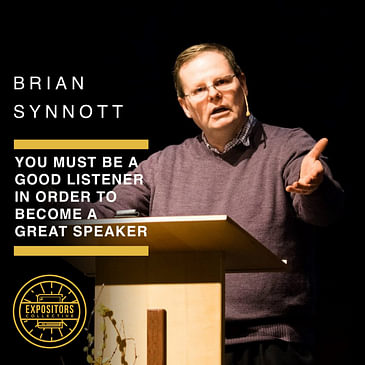Brian Synott sits down with Mike Neglia for a discussion about bivocational ministry, therapy, addiction recovery and prison ministry. He recounts his first sermon at a hyper-charismatic youth group in county Cork, Ireland in the late 1980s and the significant growth that has taken place in his ministry since then. They speak about the surprising influence of Calvary Chapel on Brian’s preaching philosophy and the value of verse-by-verse teaching as a way of growing believers AND combating heresy. They also speak about cigarettes, dyspraxia, guest-speaking, and the importance of being a good listener before you attempt to be a good speaker.
Biography:
Brian is married to Doris and has three sons, Chris, Andrew and Nathan. As a teenager, Brian had a dramatic encounter with God, which marked the beginning of a journey away from severe depression and other troubles.
40 years on, Brian has been ordained as a Christian Minister (Elim), pastored for over 20 years, and led in planting churches in Ireland. He is the National Director of Christian Counselling International (Ireland). He has practised as a Theotherapy counsellor for nearly 25 years. He has worked with a total of 7 Christian Drug and Alcohol Rehabilitation centres, the primary centres being with Teen Challenge U.K. and Tiglin Ireland. He has been the Services manager for Dublin Christian Mission, managing a team thats remit was to bring hope to those with adtive addiction and homelessness, etc.... He has been the Supervisor of the Elevate Program in the YMCA, leading young people under 25 in their aftercare program / away from a life of substance misuse towards functionality, further education, employment etc.… He works as a prison Chaplain and counsels, trains, and supervises other Theotherapy counsellors. He is regularly asked to speak in seminars/workshops on Theotherapy and is often a guest preacher / Bible teacher. Brian loves to speak on the radio on both Biblical and Mental Health subjects.
Brian’s primary Honours degree is in Christian Ministry and Theology from Manchester University. He has since earned a Doctorate in Theotherapy and a Stage 3 Supervisory qualification with the British Association of Counsellors and Practitioners in the U.K. (B.A.C.P.).
He has been a lecturer in the Teen Challenge Leadership Academy as well as teaching/training the staff of T.C.U.K..
He loves the Word of God and is passionate about seeing Christians released to their full potential, thus assisting many other people in their lives and ultimately glorifying the Lord Jesus Christ.
Recommended Episodes:
Bridging the Gap between Counselling and Preaching - Conor Berry : https://expositorscollective.org/expositors-collective-podcast/bridging-the-gap-between-counselling-and-preaching-conor-berry/
Learning from John the Baptist - George Scanlan: https://www.expositorscollective.com/podcast/2021/2/16/learning-from-john-the-baptist-george-scanlan
What is the Holy Spirit doing when we Preach? Fred Sanders : https://cgnmedia.org/podcast/expositors-collective/episode/applied-pneumatology-what-is-the-holy-spirit-doing-when-we-preach
Resources Mentioned:
Brian's sermon at Calvary Cork: https://youtube.com/live/Z63tQLdzLwM
"Neither a borrower nor a lender be" : https://poemanalysis.com/shakespeare-quotes/neither-a-borrower-nor-a-lender-be/
Cork YMCA : https://ymca-ireland.net/cork-regional/
Connect with Us:
For information about our upcoming training events visit ExpositorsCollective.com
The Expositors Collective podcast is part of the CGNMedia, Working together to proclaim the Gospel, make disciples, and plant churches. For more content like this, visit https://cgnmedia.org/
Join our private Facebook group to continue the conversation: https://www.facebook.com/groups/ExpositorsCollective
Click here to support Expositors Collective





